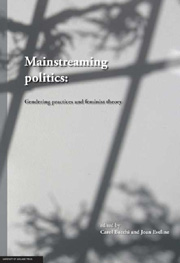Book contents
- Frontmatter
- Contents
- Preface
- Personal reflection
- Publisher's note
- List of authors and project personnel
- Acknowledgements
- Introduction
- 1 Gender/ing impact assessment: Can it be made to work?
- 2 Mainstreaming and neoliberalism: A contested relationship
- 3 Gender analysis and social change: Testing the water
- 4 What are we mainstreaming when we mainstream gender?
- 5 Approaches to gender mainstreaming: What's the problem represented to be?
- 6 Power, resistance and reflexive practice
- 7 Gender mainstreaming: The answer to the gender pay gap?
- 8 Gender analysis and community participation: The role of women's policy units
- 9 The invisibility of gendered power relations in domestic violence policy
- 10 Gender mainstreaming versus diversity mainstreaming: Methodology as emancipatory politics
- 11 University-public sector research collaboration: Mine the space, never mind the gap
- 12 Obeying organisational ‘rules of relevance’: Gender analysis of policy
- 13 Gender mainstreaming or diversity mainstreaming? The politics of ‘doing’
- Conclusion A politics of movement
- Author Index
- General Index
Conclusion A politics of movement
Published online by Cambridge University Press: 05 June 2012
- Frontmatter
- Contents
- Preface
- Personal reflection
- Publisher's note
- List of authors and project personnel
- Acknowledgements
- Introduction
- 1 Gender/ing impact assessment: Can it be made to work?
- 2 Mainstreaming and neoliberalism: A contested relationship
- 3 Gender analysis and social change: Testing the water
- 4 What are we mainstreaming when we mainstream gender?
- 5 Approaches to gender mainstreaming: What's the problem represented to be?
- 6 Power, resistance and reflexive practice
- 7 Gender mainstreaming: The answer to the gender pay gap?
- 8 Gender analysis and community participation: The role of women's policy units
- 9 The invisibility of gendered power relations in domestic violence policy
- 10 Gender mainstreaming versus diversity mainstreaming: Methodology as emancipatory politics
- 11 University-public sector research collaboration: Mine the space, never mind the gap
- 12 Obeying organisational ‘rules of relevance’: Gender analysis of policy
- 13 Gender mainstreaming or diversity mainstreaming? The politics of ‘doing’
- Conclusion A politics of movement
- Author Index
- General Index
Summary
This collection of essays establishes the claim that it is unwise to think about ‘gender mainstreaming’ or ‘gender analysis’ as sets of procedures that necessarily make useful changes when they are put into place as policies. Rather we direct attention to the on-the-ground political deliberations (at every level of social interaction) that affect what gets done and who gets to do it. It is the ‘doings’, the practices, that generate long-term learning and commitment, and that create the possibility that gender analysis can have some impact over time on the asymmetrical power relations between women and men (Chapters 7, 10 and 13).
The implications for policy development are significant. One overriding message is the need to create the time and space for public servants both to reflect upon the nature of ‘gender analysis’ and to participate actively in applying it. As Chapter 12 makes explicit, in the GAP project those who were personally engaged in the work of gender analysis were the ones most likely to come to see its relevance. As also noted in that chapter, those policy workers tended, in the main, to be women with lesser institutional authority. It follows, as argued there, that, if gender analysis is to become a meaningful and useful equality initiative, all policymakers, especially those in positions of institutional authority, need to ‘do’ gender analysis.
As part of this ‘doing’, there is need for reflection on the concepts and categories produced as part of the gender analysis exercise, for example, ‘gender’, ‘equality’, ‘difference’.
- Type
- Chapter
- Information
- Mainstreaming PoliticsGendering Practices and Feminist Theory, pp. 335 - 344Publisher: The University of Adelaide PressPrint publication year: 2010
- 1
- Cited by



